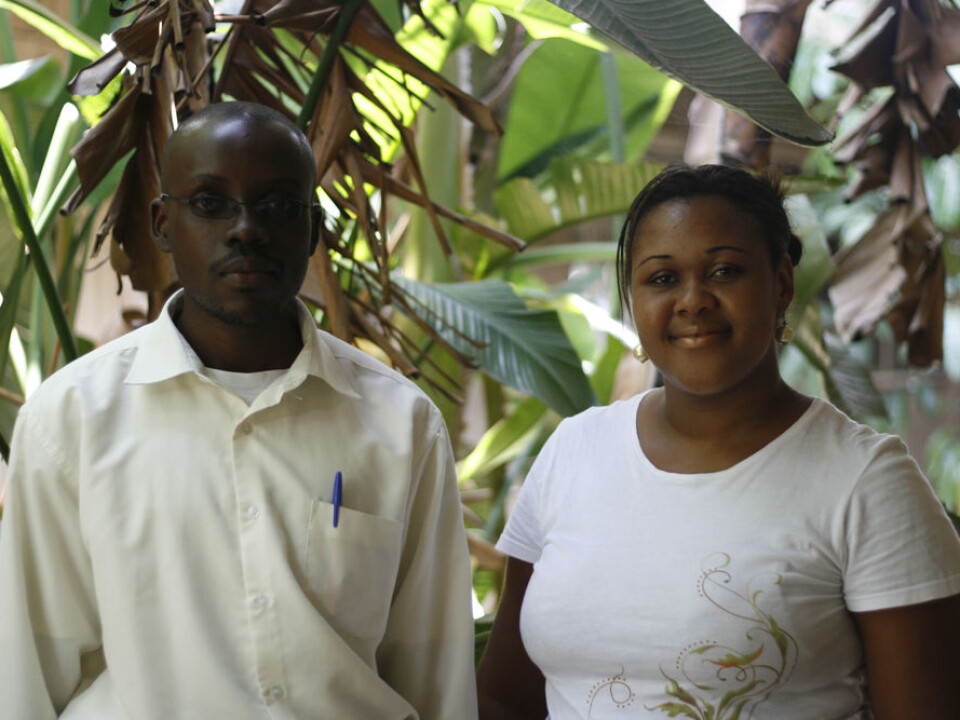This article was produced and financed by Diku - The Norwegian Agency for International Cooperation and Quality Enhancement in Higher Education

HIV-specialists in high demand in Zambia
In a country struggling with an extreme HIV epidemic, the University of Zambia is educating neuropsychologists to deal with the huge demand for professionals.
Denne artikkelen er over ti år gammel og kan inneholde utdatert informasjon.
A common side effect of HIV infection is cognitive impairment. There are evidence showing that HIV has a strong impact on mental health measured by mental distress; as many as five per cent develop dementia as a result of HIV.
In Zambia there is an enormous gap between the need for expertise in diagnosing HIV-related cognitive impairment and actual, available resources.
The University of Zambia is trying to remedy this situation, with the support of the Norwegian Programme for Development, Research and Education (NUFU) and Norad's Programme for Master Studies (NOMA) in collaboration with University of Bergen (UoB) and the Norwegian University of Science and Technology (NTNU), .
An epidemic in decline?

“It is a myth that HIV in Africa was caused by poverty. On the contrary, it first took off amongst those with relatively good education and resources – in the 1970s and 80s – before preventive programmes were started,” Professor Knut Fylkesnes (UoB) says.
The NUFU project he is coordinating shows that this has changed the past 10 to15 years: educated people responded quickly to preventive messages and now the spread of HIV is most frequent among the poor.
In 2011, new HIV infections amongst young urban women in Zambia dropped by forty per cent. This trend is the result of twenty years of hard work to change attitudes towards HIV, which has slowly brought about behavioural changes in the population.
Professor Fylkesnes has been central in the NUFU-supported academic partnership in research and capacity building ‘Strengthening HIV-related interventions in Zambia: cooperation in research and institution capacity building’, which was started in 2002.

The project aims to increase the academic capacity at the University of Zambia (UNZA) in the fields of community health and HIV prevention.
From prevention to treatment
With the influx of antiretroviral drugs, however, the emphasis in HIV intervention in Africa has turned from prevention to treatment. Moreover, some are claiming that the treatment approach is overstretching the capacity of African healthcare systems.
Zambia is one of the countries worst affected by HIV in Sub-Saharan Africa, with about 15 per cent of people aged 15 to 49 infected. With more than 13 million inhabitants, the country is struggling with serious capacity shortages which are very much related to the limited pool of people with higher education.
The NUFU-project has been focusing on building capacity. Zambians has been training at PhD level in epidemiology, mental health, demography, health promotion, medical anthropology, health economics, sexually transmitted diseases and maternal health in cooperation with University of Bergen.
First Master's degree in neuropsychology
The collaboration has generated new knowledge with various important policy implications in Zambia and the region and with this multidisciplinary capacity improvement, the University of Zambia has decided to establish a School of Public Health. A NOMA-supported Master of Science in Epidemiology was established in 2010 as well, to meet the high demand for well trained epidemiologists that exists throughout most of the region.
The Master’s degree in neuropsychology in cooperation with NTNU recruits students with a wide range of professional experience, including from the armed forces, police, nursing, biochemistry and education into the highly specialised research field of neuropsychology; it is also the first interdisciplinary collaboration between three different schools within UNZA: the School of Medicine, School of Humanities and Social Sciences and School of Education.
This is said to be the only Master’s degree in neuropsychology in all of Africa.
The idea is that the neuropsychologists educated through the programme will disperse into each of the different professional fields they originally came from and that some of them will contribute to the growth of academic capacity at UNZA.
From policing to diagnosing HIV impairment
One of the second cohort neuropsychology students, Mazuba Hamweene, joined the police force in 2004, but early on took an interest in disabled people and decided to do a Bachelor’s degree in Special Education. After he finished his studies, he went back to the police force to work with the victims support unit. At at the unit he was given the task of so-called pre HIV-test counselling.
This triggered his interest in incorporating the health aspect into his skills set, and he applied for the Master’s in neuropsychology at UNZA.
“This is a new field in the police force, and I will be the first one ever to have this qualification. I might meet some challenges, though, but I will fight and hope for the establishment of a neuropsychology unit in the police force.
"I have already started the preliminary work talking to the directors about what I am doing, and they have shown much interest. Immediately after I finish I will go back and work with them,” says Mazuba.
Prolonged life spans create new needs
With the advance of new antiretroviral drugs, science has now been able to extend the life expectancy of HIV-infected people so that many now enjoy a more or less normal life span. This is great news for all HIV sufferers.
But there are rocks in the sea. Recent research has shown that as many as up to eighty per cent of all sufferers experience some degree of intellectual functionality impairment as a result of the virus.
In addition, some of the drugs are neurotoxic, and for patients developing mental disturbances it is imperative to avoid this type of medication.
“We want to bridge this gap with the help of the new Master’s programme in neuropsychology.
"If we, in one way or the other, can detect mental disturbances before they start to play havoc with a person’s life and disturbs his mental health, maybe we can intervene earlier and help the patient to live a better life,” says Dr. Ravi Paul, who is working at UNZA as one of two psychiatrists in Zambia.
Technology does not solve all problems
Technology cannot solve all problems. MRIs, CT and PET scanners can detect the pathology of the brain and body. They cannot, however, detect any mental disability or HIV-related brain trauma that a person carries.
“We don’t have any gadget to detect what mental disabilities and HIV-related brain trauma a person carries. No one was exploiting that field, and we didn’t have any hard evidence to prove that HIV is causing trauma or dementia.
"Now, with the help of the coming neuropsychologists we can say: this is what happens, this is what went wrong, and this is now the disabilities they are carrying,” Dr. Paul explains.
Need for more specialists
There are many reasons for conducting neuropsychological testing of HIV-infected people.
One is of course to uncover special needs and to provide the necessary healthcare. Another is the requirement to check workers in certain occupations before they enter into the professional field – are they capable of handling high-stress jobs?
The need for educating more neuropsychologists in the years to come is beyond any doubt.






























